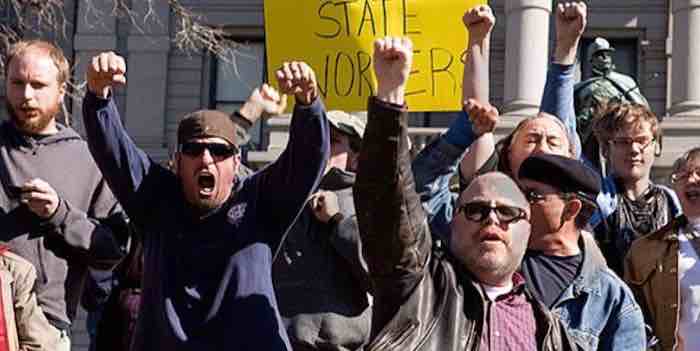By Dan Calabrese ——Bio and Archives--June 27, 2018
American Politics, News | CFP Comments | Reader Friendly | Subscribe | Email Us
 We’ve thought for months that this might be coming, and both the public sector unions of America and their primary beneficiary – the Democratic Party – have been bracing for impact.
BOOM. We have a direct hit.
The Supreme Court ruled today that public-sector unions cannot force those not willing to join into paying dues. This practice has been the only thing keeping most public-sector unions alive, as more and more workers recognize that they exist to push a political agenda and not to serve the interests of their members. Why would you pay dues to an organization you don’t want to be part of, and that you don’t believe serves you in any positive way?
We’ve thought for months that this might be coming, and both the public sector unions of America and their primary beneficiary – the Democratic Party – have been bracing for impact.
BOOM. We have a direct hit.
The Supreme Court ruled today that public-sector unions cannot force those not willing to join into paying dues. This practice has been the only thing keeping most public-sector unions alive, as more and more workers recognize that they exist to push a political agenda and not to serve the interests of their members. Why would you pay dues to an organization you don’t want to be part of, and that you don’t believe serves you in any positive way?By a 5 to 4 vote, the justices overturned a 41-year-old precedent and ruled that the 1st Amendment protects these employees from being required to support a private group whose views may differ from theirs. The decision, in Janus vs. AFSCME, strikes down laws in California, New York and 20 other mostly Democratic-leaning states that authorize unions to negotiate contracts that require all employees to pay a so-called fair share fee to cover the cost of collective bargaining. California’s politically powerful labor unions have been preparing for this Supreme Court ruling for a long time. In 1977, when public sector unions were getting established, the high court said teachers and other public employees may not be forced to pay full union dues if some of the money went for political contributions. But the justices upheld the lesser fair share fees on the theory that all of the employees benefited from a union contract and its grievance procedures. But today’s more conservative court disagreed and said employees have a right not to give any support to a union. These payments were described as a form of “compelled speech” which violates the 1st Amendment.
The anti-union National Right to Work Foundation, which funded the challenge, predicted the ruling would free more than 5 million public employees from supporting their unions. For the unions, which traditionally support Democrats, the ruling will mean an immediate loss of some funding and a gradual erosion in their membership. Union officials fear that an unknown number of employees will quit paying dues if doing so is entirely optional.That last sentence from the L.A. Times excerpt pretty much tells you all you need to know about the unions of today. The unions know that employees don’t want to join them or pay dues to them by choice, because they don’t believe the proposition that they get real benefits out of doing so. But there is someone who gets a lot of benefits out of those compulsory memberships and dues, and that is the Democratic Party, which relies heavily on unions – and especially public-sector unions – for campaign funding. Democrats will now push hard on unions to give an increasing share of their shrinking pie to political uses, but that’s going to create a real conundrum for the unions. If employees don’t have to pay dues unless they want to, and they’re concerned about unions simply sending their money off to Democrats, then the unions are likely to lose even more members if they up the percentage of their treasury funds that are going to politicians. The smartest thing for unions to do here is to start actually playing a positive and constructive role in advocating for their members’ true best interests, which would mean to stop wasting their dues money on politicians and start using it all for the benefit of the members. But if they do that, then where are Democrats going to get the money to pay for the campaigns? After all, it’s Democrats who, once in office, pass the laws that force people to pay union dues even when they don’t want to – knowing full well of course that the money will come back to pay for Democrat campaigns. Then again, such laws are now struck down as unconstitutional, so it’s worth asking what return unions can get on their investment in Democratic candidates anyway. Maybe they’re better off just staying out of politics altogether. Maybe we’re all better off if they do. OK, not Democratic candidates. But what’s bad for them is, by definition, good for the rest of us.
View Comments
Dan Calabrese’s column is distributed by HermanCain.com, which can be found at HermanCain
Follow all of Dan’s work, including his series of Christian spiritual warfare novels, by liking his page on Facebook.